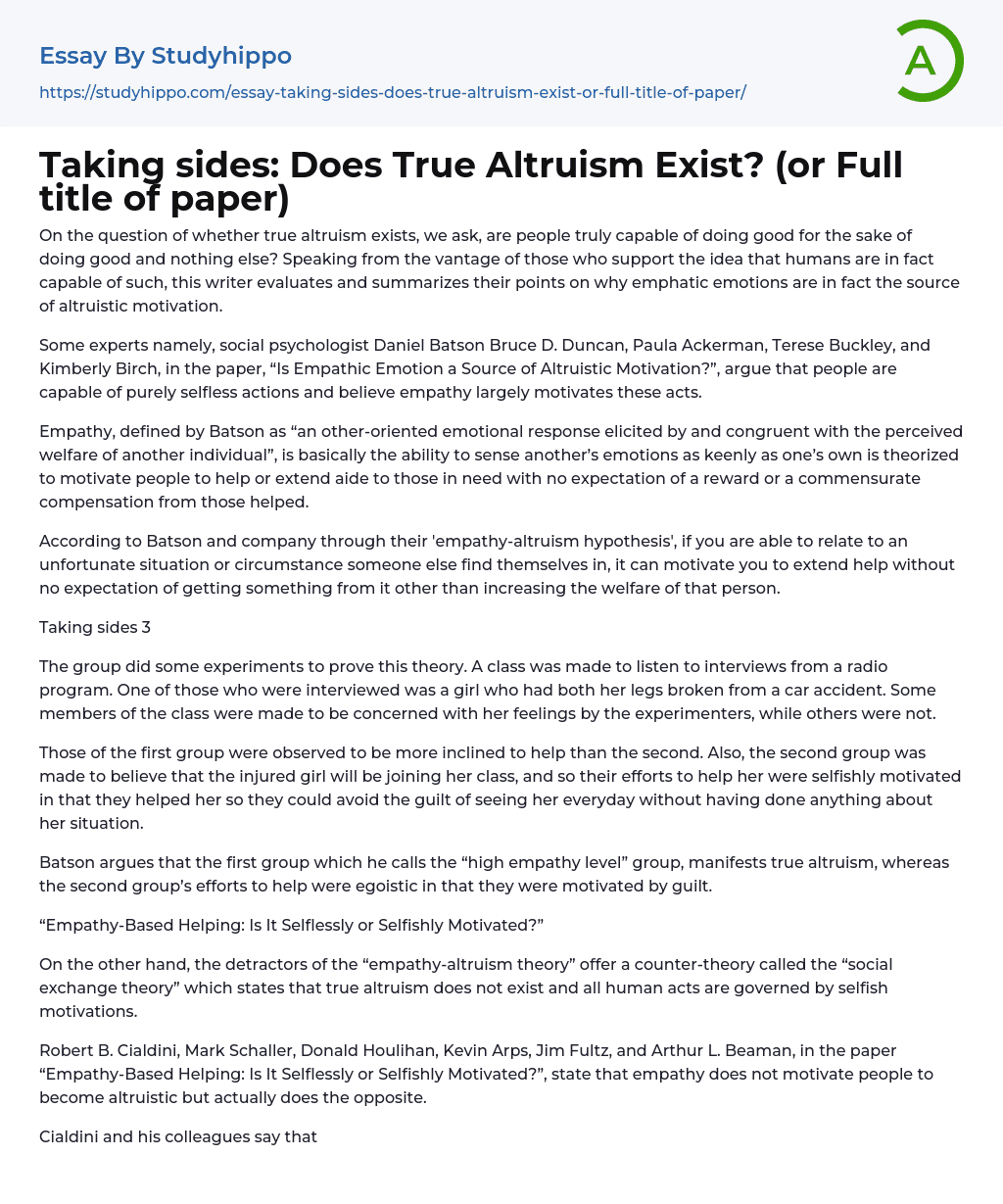

Taking sides: Does True Altruism Exist? (or Full title of paper) Essay Example
On the question of whether true altruism exists, we ask, are people truly capable of doing good for the sake of doing good and nothing else? Speaking from the vantage of those who support the idea that humans are in fact capable of such, this writer evaluates and summarizes their points on why emphatic emotions are in fact the source of altruistic motivation.
Some experts namely, social psychologist Daniel Batson Bruce D. Duncan, Paula Ackerman, Terese Buckley, and Kimberly Birch, in the paper, “Is Empathic Emotion a Source of Altruistic Motivation?”, argue that people are capable of purely selfless actions and believe empathy largely motivates these acts.
Empathy, defined by Batson as “an other-oriented emotional response elicited by and congruent with the perceived welfare o
...f another individual”, is basically the ability to sense another’s emotions as keenly as one’s own is theorized to motivate people to help or extend aide to those in need with no expectation of a reward or a commensurate compensation from those helped.
According to Batson and company through their 'empathy-altruism hypothesis', if you are able to relate to an unfortunate situation or circumstance someone else find themselves in, it can motivate you to extend help without no expectation of getting something from it other than increasing the welfare of that person.
Taking sides 3
The group did some experiments to prove this theory. A class was made to listen to interviews from a radio program. One of those who were interviewed was a girl who had both her legs broken from a car accident. Some members of the class were made
to be concerned with her feelings by the experimenters, while others were not.
Those of the first group were observed to be more inclined to help than the second. Also, the second group was made to believe that the injured girl will be joining her class, and so their efforts to help her were selfishly motivated in that they helped her so they could avoid the guilt of seeing her everyday without having done anything about her situation.
Batson argues that the first group which he calls the “high empathy level” group, manifests true altruism, whereas the second group’s efforts to help were egoistic in that they were motivated by guilt.
“Empathy-Based Helping: Is It Selflessly or Selfishly Motivated?”
On the other hand, the detractors of the “empathy-altruism theory” offer a counter-theory called the “social exchange theory” which states that true altruism does not exist and all human acts are governed by selfish motivations.
Robert B. Cialdini, Mark Schaller, Donald Houlihan, Kevin Arps, Jim Fultz, and Arthur L. Beaman, in the paper “Empathy-Based Helping: Is It Selflessly or Selfishly Motivated?”, state that empathy does not motivate people to become altruistic but actually does the opposite.
Cialdini and his colleagues say that when we empathize with those who need to be helped, we do so because we feel guilty or depressed and so to alleviate the pain we feel which is an echo of those who are suffering, we help them. At the end of the day, they say, these are actions are still
Taking sides 4
governed by self-interest in that we do not necessarily look out
for the welfare of those who are suffering, but ultimately, we are simply concerned with our own suffering or pain which we are able to feel when we empathize.
Also, Cialdini’s group argues that even those seemingly selfless acts we see everyday such as philanthropists giving money to the poor or social workers risking life and limb without monetary compensation may be still be selfishly motivated.
Philanthropists who extend donations may do these to make themselves feel good while social workers may do what they do because it gives them self-fulfillment. Either way, these acts are still egoistic and not altruistic.
- Adult essays
- Aggression essays
- Altruism essays
- Archetype essays
- Behavior essays
- Certainty essays
- Conformity essays
- Deception essays
- Human Behavior essays
- Human Sexuality essays
- Maturity essays
- Morality essays
- Obedience essays
- Procrastination essays
- Reinforcement essays
- Role Model essays
- Ambition essays
- Anger essays
- Betrayal essays
- Boredom essays
- Confidence essays
- Courage essays
- Desire essays
- Disgrace essays
- Doubt essays
- Empathy essays
- Fairness essays
- Fear essays
- Feeling essays
- Forgiveness essays
- Grief essays
- Guilt essays
- Happiness essays
- Harmony essays
- Hate essays
- Honesty essays
- Honor essays
- Hope essays
- Humanity essays
- Inspiration essays
- Kindness essays
- Laughter essays
- Loneliness essays
- Lost essays
- Loyalty essays
- Need essays
- Passion essays
- Pressure essays
- Pride essays
- Regret essays



